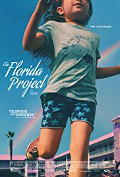
Directed by
Sean Baker
111 minutes
Rated MA
Reviewed by
Bernard Hemingway


The Florida Project
Synopsis; It is the summer vacation for six-year-old Moonee (Brooklynn Prince) who lives in the shadows of Disney World in a low rent motel with her skanky mother, Halley (Bria Vinaite). For both, trouble is never far away.
Although the co-writer, co-producer, director and editor, Sean Baker, has moved away considerably from his technically-bold 2015 “Iphone” movie, Tangerine into more conventional cinematic territory (the film was crisply shot in 35mmm by cinematographer Alexis Zabe), The Florida Project still takes the lives of marginalized characters as its subject matter but enlarges its predecessor's scope to deliver a telling portrait of at least one facet of modern America (in which respect it shares some qualities with 2016’s not-so-effective American Honey)
There are multiple dynamics driving The Florida Project (which was once the in-development name for Disney World). The most fundamental is the contrast between the world of garishly-painted, tackily-themed budget motels in which the film’s characters live more or less permanently and the sugar-coated, when-you-wish-upon-a-star-makes-no-difference-who-you-are fantasies embodied by nearby Disney World. We never see the latter (at least not until the last shot) but are made aware of it by a local discount souvenir warehouse and scenes in which Halley panhandles Disney World tourists in hotel car-parks even at one point selling entry bracelets that she has stolen from one of her johns. Its make-believe presence provides a bitterly ironic background to the realities of Halley and Moonee’s lives as well as those of their fellow denizens of their completely inappropriately named motel, the Magic Castle, and its neighbour, Future Land (which are in actuality real motels).
It is the mother-daughter relationship which provides the film’s main dynamo. On the one hand it is a close relationship, one which Halley would claim was love but which is from our viewpoint, a toxic one, with Halley, whose “love” for her daughter is entirely selfish, a kind of parasite or pollutant destroying the child’s innocence. This is brought out in Halley’s relationship with a downstairs neighbour (Mela Murder) who comes to realize just how corrupt Halley is and forbids her own child from having anything to do with Moonee. Baker gets remarkably verisimilitudinous performances from both these untrained actresses.
Perhaps all this sounds grim but there is a good deal of humour, even childhood wonder, in The Florida Project. That Baker and his Tangerine co-writer Chris Bergoch get the mix of elements so right is quite remarkable (my favourite shot was an extreme close-up of Halley’s mouth as she bellows “F**K YOU” at the welfare officers about to take her daughter away. It’s so childish in its inarticulate rage that one can’t help but laugh and in a way that is entirely symptomatic of the film).
There is, however, another dynamic at work here that mollifies the tawdriness and that is in the relationship between Willem Dafoe’s Bobby, the motel manager, and Halley and her daughter. Although probably in reality a little too good to be true, Bobby is a compassionate man who realizes that his motel is the last stop before the streets for Halley and Moonee. He endures Halley’s tantrums and Moonee’s mischief-making as he tries to keep out a would-be paedophile, gets an aging transsexual to stop bathing topless, and run a respectable business. It’s one of the most engaging performances in a long time from an actor who is too often seen these days In little more than cameos.
Want something different?





